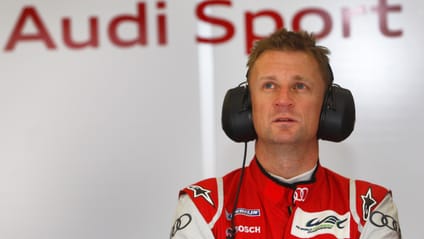
Allan McNish: WEC is ‘the most advanced’ motorsport
But that doesn’t make it a rival to Formula 1, argues three-time Le Mans winner


The World Endurance Championship is a competition on the rise. Now in its fifth season, it has an audience that is growing steadily, both in the stands and on rival grids around the world.
Nico Hulkenberg’s victory alongside Nick Tandy and Earl Bamber in the #19 Porsche at the 24 Hours of Le Mans last year kickstarted a big debate within motorsport, and in Formula 1 especially: suddenly, the likes of Fernando Alonso and Daniel Ricciardo were itching to have a go as well.
However, the progress of the sport isn’t simply down to big-name association. Balance of performance measures make the racing close, an open paddock makes the drivers accessible and the mixture of sportscars and prototypes ensures broad appeal. Variety, as they say, is the spice of life.
To make sense of it all TG spoke to Allan McNish, who together with Tom Kristensen and Loïc Duval won the WEC’s drivers championship with Audi in 2013. Also a three-time victor at Le Mans, the Scotsman has seen first-hand the transformation endurance racing has enjoyed in recent years.
Now a commentator, pundit and director at Audi Group Motorsport, McNish believes the World Endurance Championship has a bright future...
Advertisement - Page continues belowWhy are people attracted to the World Endurance Championship?

“Because it’s quite pure. It’s funny, because in terms of the technology it is the most advanced. We’re running with extremely big hybrid systems that are producing so much power that the cars themselves have got more downforce than a Formula 1 car. The tyres? You can lean on them. The hybrid systems? They’re bigger. Technically, it’s extremely advanced, which is something the average Formula 1 fan kind of gets put off by, in a way.
“It’s very hard racing, it has got very much an open-access paddock. At Le Mans for example, for drivers to go to the hospitality units for lunch, they walk through the fan area. And I think that is a very important part of it, because for the future you need to allow the young fans to touch it, and smell it, and feel it, and maybe get an autograph or a picture with their preferred driver. I like that because I was one of those kids once, and I need that inspiration. I think that’s a very positive part about it live at the circuit.”
Image credit: Photo©AdrenalMedia.com
Could anyone have predicted the WEC’s success five years ago?

“I think considering where we are, and where we were, it’s had a very, very rapid rise. If we rewind to the deadline date of the first season, Audi’s main competitor Peugeot pulled out of motorsport because of big budget issues. And at that moment in time, so many people said ‘The WEC is dead before it even starts’. Now we’re talking about it in very different ways. That was a speedbump and it’s gone from strength to strength from there.”
Image credit: Photo©AdrenalMedia.com
Advertisement - Page continues belowWhat has helped its popularity in the last few years?

“Hulkenberg last year coming in and winning Le Mans, and then him saying a couple of weeks later at the Austrian Grand Prix what the car was like to drive, how fun it was, how good it was... The likes of Alonso talking about wanting to do it as soon as he retires from Formula 1, and Ferrari making murmurs that they wanted to step up from the GT category to LMP1 at one point. All of these things I think have definitely opened up the eyes of the general public a little bit more to Le Mans, as maybe as it was in the 70s.”
What makes it work as a spectacle?

“Sportscar racing has been around for a long period of time, and especially Le Mans. It resonates so much with the motor racing fraternity, but also people outside of motor racing. However for the World Endurance Championship itself, 2012 was the first year. And therefore it’s very much in its embryonic stages. However it’s working with the fact that it’s got races like the Six Hours of Silverstone, traditional events like Nürburgring, Le Mans obviously being a key part of it, Fuji in Japan... And so as much as it’s very, very new, it’s actually combining the new and the old.”
Image credit: Photo©AdrenalMedia.com
F1 will leave terrestrial TV in the UK in 2019. Could WEC fill the void?

“Sports TV rights are becoming very expensive. I know and saw that very clearly with Formula 1 on the BBC. They couldn’t afford to continue with the Formula 1 rights. And then that went to Channel 4, and even though they’re less than half way into their first season of the contract, they already know that they’re not going to be able to continue. So it’s becoming a big battle ground where terrestrial TV companies and historic TV companies aren’t able to keep up. Which I think is quite sad actually.
“If the desire is there, then I can tell you the WEC’s desire is there. But ultimately it’s what the audiences want. And if there’s enough connection between the two, then it will happen. But it’s about trying to make sure that you’ve got a product that’s a little bit different.”
Image credit: Photo©AdrenalMedia.com
6-hour races are certainly different. But won’t the length put some viewers off?

“I think it will have to, as every sport does, evolve and adapt a little bit. There’s people who would want to sit down and watch it for the entirety and there’s others that won’t. The highlights package on Channel 4 is a very good taster for people who want to get involved. Is it going to be held back by that? I don’t think so, but it depends where it wants to go.
“I don’t think it’s competition to Formula 1. It’s a different type of event. Audi and Porsche are involved in sportscar racing for a reason, as are Toyota. We’re talking about two brands from the second biggest car manufacturer in the world, and the other one is the biggest car manufacturer in the world. They want to be in this for a reason: to be able to promote their competitive level with the latest technology. And they want to be able to do it at an iconic event like Le Mans and the WEC around it.”
Image credit: Photo©AdrenalMedia.com
Advertisement - Page continues belowFans can choose who they watch on the FIA WEC app. Is this the way forward?

“The WEC app first came out in 2014, and you can select the driver you want to follow if they have an on-board camera. So I could literally sit at home with the live timing, with the main feed stream and also with the particular car that I wanted to sit in the cockpit of. And I think that interaction is what people will want.
“I’ll put it a different way: it’s what my son wants. And if my son wants it and he’s 11 years old then I think I should probably listen to him, as opposed to me having seen black and white televisions coming through! I do think that their app is definitely one that is actually setting their stall out, and also setting a trend of what the fan wants, whether or not they can be at the circuit.”
Image credit: Nick Dungan
Will the World Endurance Championship eventually have more races on the calendar?

“Yes, but the races are much, much longer than a Formula 1 race. If I take Le Mans that’s about 17 grands prix, so already by the time a car has finished Le Mans they’ll have done the rest of 2016 and part of 2017’s Formula 1 season.
“Every mile you drive has a cost. So if you’re adding two more races it’s 12 more hours, plus qualifying. So you’re close to having an extra Le Mans in terms of budget in pure running costs.
“Because of that, it’s also got to be practical. You can’t just have a race in Mexico one weekend and then in Australia the next. It’s got to have a calendar that fits in. So yes I can see it happening, but I think it’s got to be done with a very conscious view, and not just having races because we want to have another race. We’ve got to have races that everybody in the paddock can have to their benefit.”
Image credit: Photo©AdrenalMedia.com
Advertisement - Page continues belowWhere’s the limit? 10 races? More?

“It’s impossible to say, because you don’t know what’s going to happen in five years’ time. You don’t know what is going to happen in terms of the way that the whole marketplace is going to go. Motorsport is changing quicker than I think it’s changed in a long, long time. And also I think the fans are changing.
“This is the tenth anniversary of the first time we raced at Le Mans and won with the diesel. Before that no one had even considered it. So in ten years we’ve gone from racing with a diesel at Le Mans, to diesel hybrids, to a huge percentage of our horsepower coming from the hybrid aspect. So there’s been a big, big change there and there will be going forward and it’s the same in every aspect.
“Today, the limitation is nine races. That’s all you can say. And then you evolve, and you have to also be very adaptable.
“That’s one thing you learn in motorsport: you’ve got to be adaptable.”
Image credit: Photo©AdrenalMedia.com
Trending this week
- Car Review
BMW 1 Series
- Top Gear's Top 9
Nine dreadful bits of 'homeware' made by carmakers







